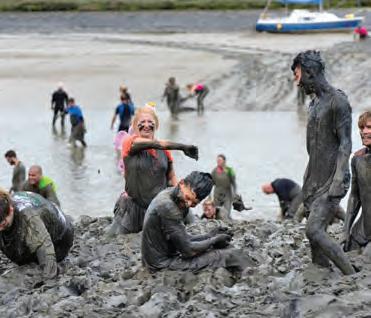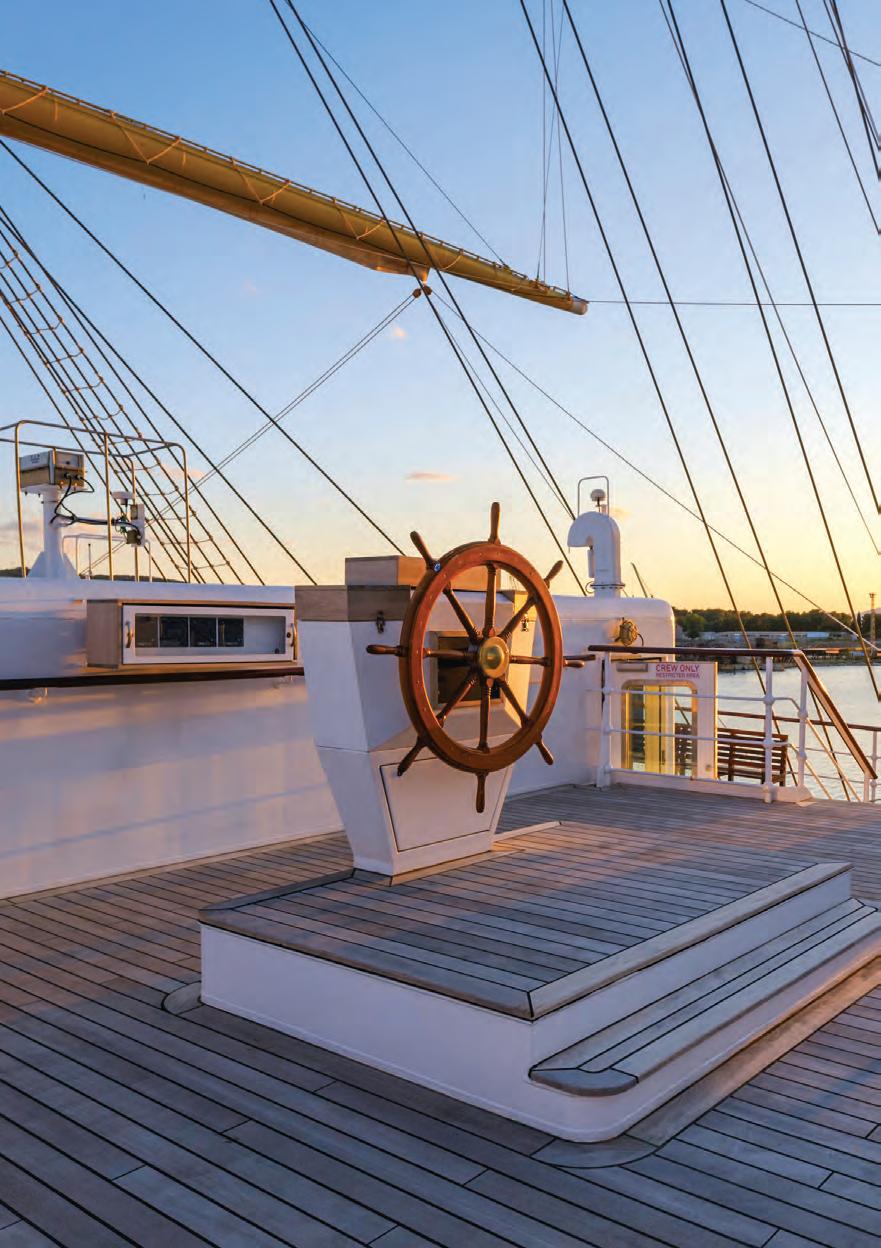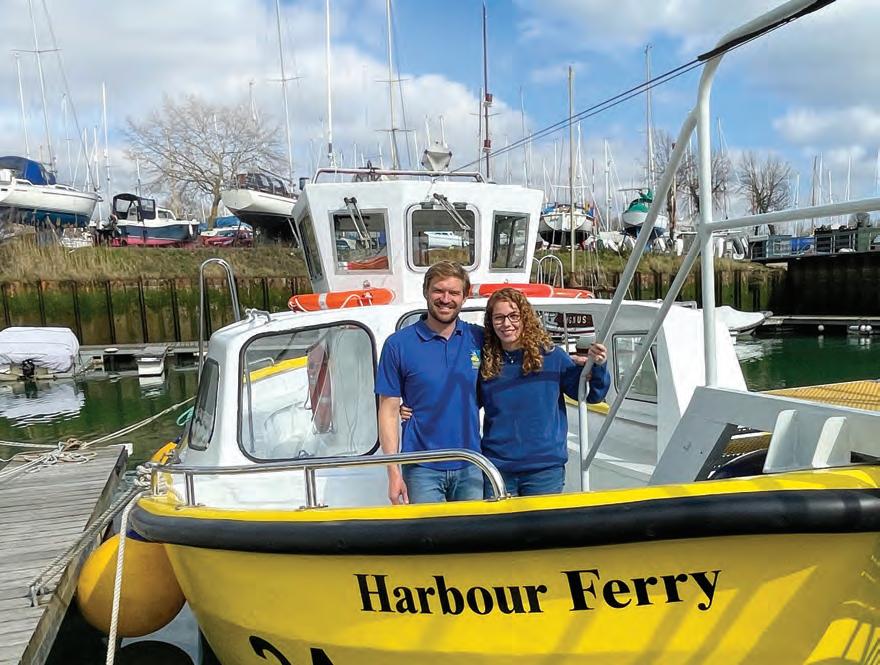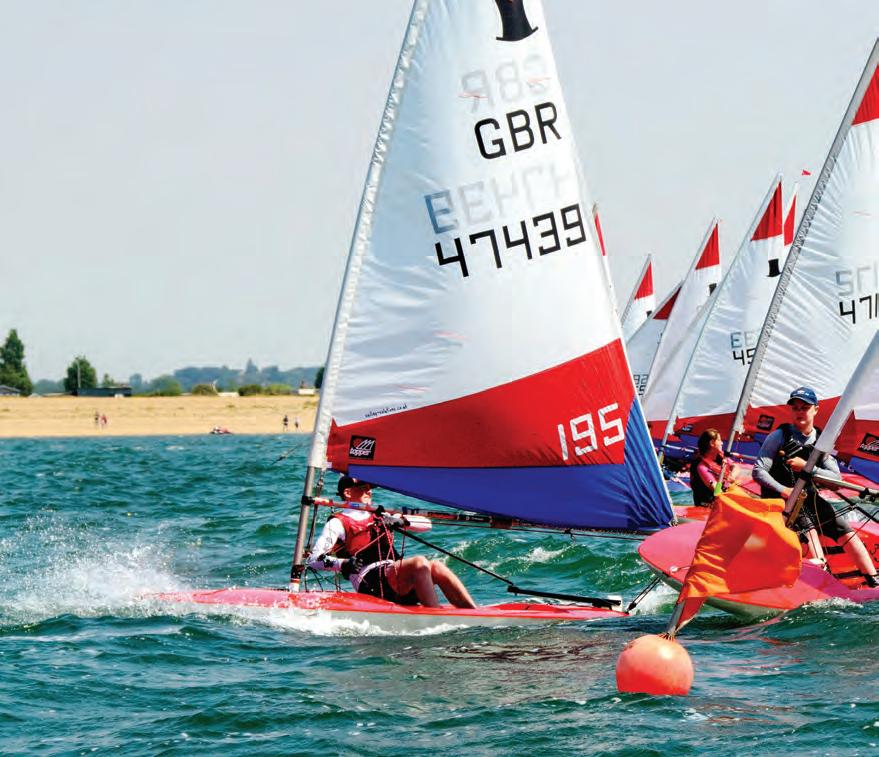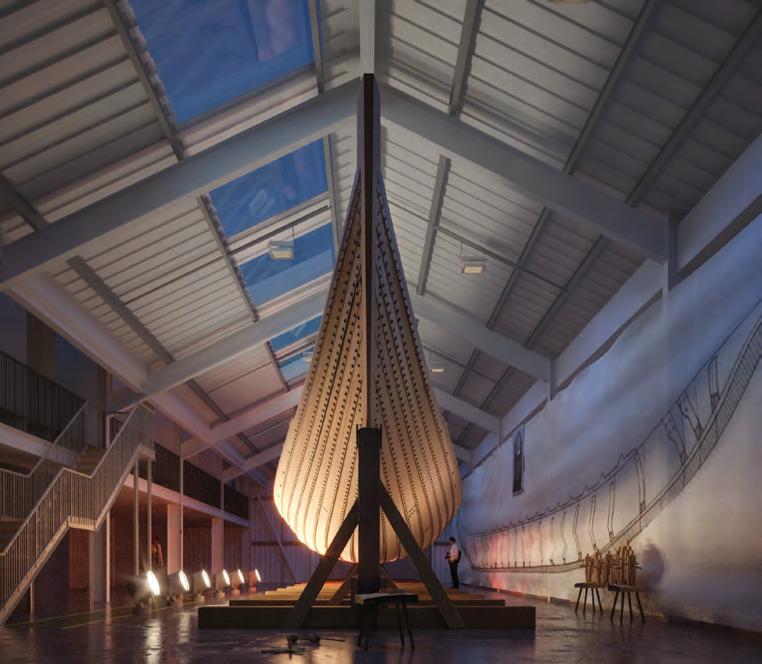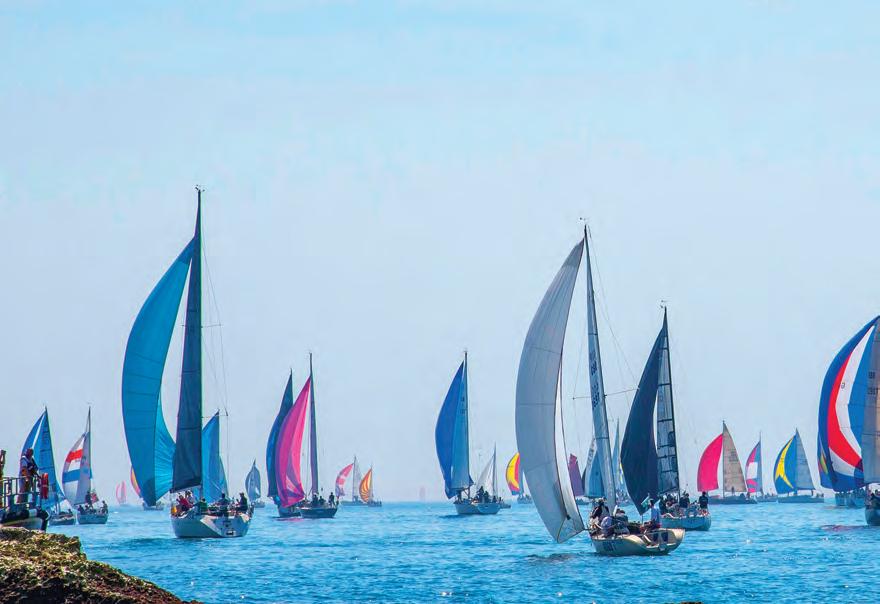
8 minute read
Sail Arthur Ransome’s Nancy Blackett
We do mean to take you to sea – or maybe just a trip down the River Orwell!
Arthur Ransome’s favourite yacht, Nancy Blackett, will be 90 this year. And remarkably, she’s still sailing –probably in better condition than ever – on the River Orwell and sometimes further afield, offering opportunities to discover the special delights of sailing a classic boat that’s also straight out of one of the best-ever sailing adventures.
Advertisement
Named by Ransome after one of his best-known characters, self-styled pirate Nancy Blackett of Swallows and Amazons fame, he put her into one of his most exciting books, We Didn’t Mean to Go to Sea. In fact he virtually built the plot around her, as the four children – the ‘Swallows’ from Swallows and Amazons – drift out of Harwich Harbour and face having to sail her across the North Sea to Holland.
Ransome bought the 28ft four-berth cutter in 1935 when he and his Russian wife Evgenia were moving into the area, from the Lake District, in search of some sea sailing. He renamed her – she was called Electron when he found her in Poole Harbour – and sailed her round to Pin Mill through some atrocious weather, which helped give him the idea for the book.
Nancy is now managed by the Nancy Blackett Trust, which was set up nearly 25 years ago to look after her, following her rediscovery – derelict in Scarborough Harbour in the 1980s – and an extensive restoration.
Our aim, still, is to make her available for anyone – old, young or in-between – to enjoy a sail and experience the feel of being aboard the Goblin. Skippered cruises ensure safe sailing (no unintentional drifting out to sea!) and trips can be short, a day or half-day cruise on the Orwell, perhaps down to Harwich and back, or long, a week or a weekend, sleeping aboard and visiting London or exploring the other rivers of the East Coast. All our sailing is under the charge
Respected sailor and writer Peter Willis is founder and President of the Nancy Blackett Trust, which celebrates its 25th anniversary next year. His book Good Little Ship explores the themes of Ransome’s rite-of-passage novel We Didn’t Mean to Go to Sea, and how it came to be writen. Part maritime history, part literary criticism – a joyous homage throughout– it’s an impeccably-researched tale of the life, neardeath, rescue and restoration of the Nancy Blackett and a thoroughly engrossing read, whether you’re a lifelong lover of Ransome’s works, or discovering them for the first time. Photographs add life to the story, while Ransome’s drawings and own account of a voyage in her – as well as brief details of his other boats – mean this is a must-have for lovers of both boats and literature. Good Little Ship is published in paperback by Lodestar Books, £14.
of a qualified volunteer skipper; membership of the Trust is needed, but the modest annual subscription covers the whole family – and children sail free.
If you’ve always wanted to feel the thrill of your sails harnessing the wind – or the peace of a quiet drift down the river on a summer’s afternoon – this is a safe and accessible way to do it, enhanced by the magic of experiencing it aboard a piece of maritime and literary history. Enjoy an al fresco lunch at anchor, miles from civilisation, or the cosy atmosphere of dining in the mahogany-panelled cabin lit by oil lamps before turning into your bunk to be rocked gently to sleep.
Ransome actually wrote two books featuring the Goblin while he lived here; the second is Secret Water, set in the Walton Backwaters. He loved the area, and would sail down there in Nancy to drop anchor for a bit of peace and quiet to work on his next book.
The Backwaters may be a bit less ‘undiscovered’ now than they were in Ransome’s day, but they still have an air of mystery and isolation, with a silence punctuated only by birdsong. They’re a favourite destination for Nancy Blackett crews, and certainly will be this year. Nancy Blackett is 28ft 6in long, plus the 10ft bowsprit. She’s been painstakingly restored to make sure she is just as Ransome would have known her, and as the Goblin is described in the book:
“I say, just look down,” said Titty. They looked down into the cabin of the little ship, at blue mattresses on bunks on either side, at a little table with a chart tied down on it with string… a little white sink opposite the tiny galley where a saucepan of water was simmering on one of the two burners of a little cooking stove.
She welcomes visitors on various open days throughout the summer, at Woolverstone and elsewhere, so come and see her and find out more about how this humble Hillyard 7-tonner became one of the most famous boats in fiction. And if you’d like to sail her yourself, just join the Nancy Blackett Trust; it’s not expensive, and you can book a day-sail or a longer passage.
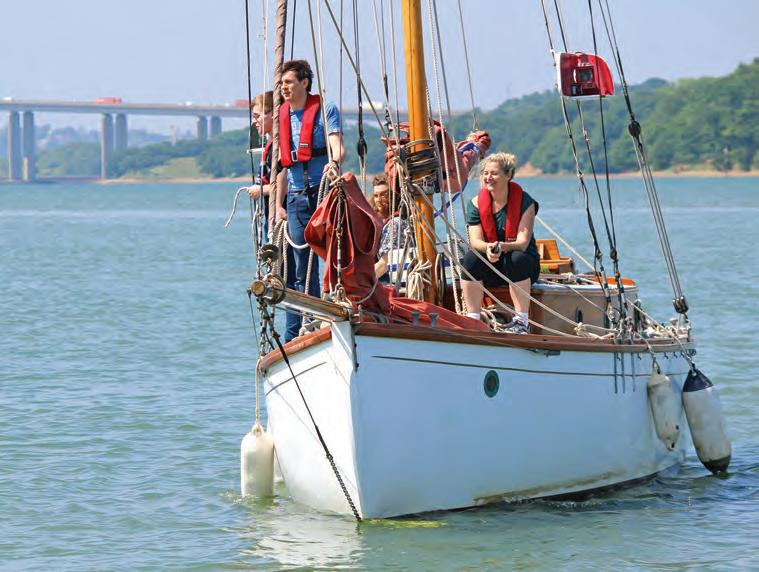
If you’d like to sail into ‘Secret Water’ aboard Nancy Blackett – or anywhere else on ‘Arthur Ransome’s East Coast’ for that matter – take a look at our website and get in touch. And don’t forget, children sail free! • www.nancyblackett.org
The Essex way

The county may be steeped in history, but this year sees the comeback of two contemporary – and fun-filled – traditions
One of the oldest recorded towns in Essex, Maldon was once a prime target for invading Vikings, largely because of its prominence as a successful working port on the River Blackwater.
Today the town’s Hythe Quay is an attraction for rather more friendly visitors, and is bestknown as the mooring place for a number of Thames Sailing Barges, the orange-sailed beauties that once transported cargoes of straw and hay for city-dwelling horses.
Come summer, though, and this timeless, tranquil place becomes the setting for a more gritty spectacle: the Maldon Mud Race, an event that began in the early 1970s and involves a very muddy, low-tide dash across the bed of the Blackwater.
The tradition is said to originate from a dare, when the landlord of the Queen’s Head pub was challenged to serve a meal on the saltings of the River Blackwater, dressed in a dinner jacket. The following year about 20 people raced across the river bed, drank a pint of beer served from a bar set up on the saltings, and then hurried back across.
Now Maldon Mud Race attracts competitors, spectators and press from all over Europe. Participants cross the short stretch of water and race along a length of the riverbed on the


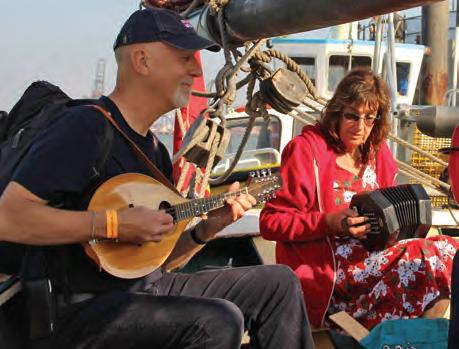

opposite side, before crossing back through the river to the finish line. The number of entrants is limited to 300 for safety reasons, and those taking part range from absolute beginners in fancy dress to marathon runners and those who specialise in stamina events. The fittest will make the crossing in five minutes but others could take hours to complete the 400 yards – the only time limit is the incoming tide.
Cancelled completely last year, this year’s Maldon Mud Race has already been moved from its usual date in May and is now scheduled to take place for the first time ever in summer, on August 15. • www.maldonmudrace.com The TikTok craze that transported so many people from the misery of last year’s lockdown resulted in a huge revival of interest in shanties and sea songs. While we were all, literally, stuck in the same boat, songs about sugar and rum, sweethearts, work and home brought people together. More than 74 million views were recorded on the app that allowed even those most isolated to join a choir of strangers, and Scottish postman-turned-social media sensation Nathan Evans gave up his day job after reaching number one in the UK charts with his remix of Wellerman, a 19th- century sea shanty.
The comeback continues with the return of Harwich’s popular Shanty Festival. Last year’s event would have coincided with the 400th anniversary of the Pilgrim Fathers’ voyage to the New World. Harwich has close connections with that famous voyage, and the town had planned a year-long programme of Mayflower-related events until the pandemic struck.
In normal Shanty Festival times, Harwich rings with the sound of songs, music and voices coming from pubs, boats, clubs and the old seaport’s many historic buildings. There are street theatre sketches, maritime crafts, promenading pirates, barge trips and workshops on offer as the town fills with colour and visitors soak up the atmosphere created over a special weekend.
This year the event – scheduled for October 8-10 – will be in its 16th year and organisers say: “Rest assured that the 2021 Festival, whilst it may look a little different from usual, will concentrate on bringing you an all-round shanty experience, featuring a wide selection of experienced shanty singers for you to enjoy.” • www.harwichshantyfestival.co.uk
